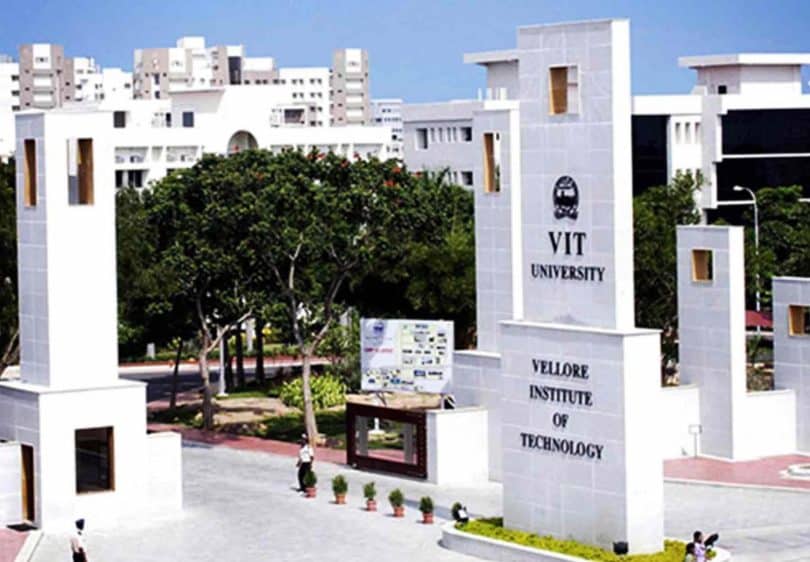VIT University conducts an entrance exam for those candidates who are seeking admission in the Bachelors of Technology Courses i.e., B. Tech. “Vellore Institute of Technology Engineering Entrance Examination” is abbreviated as VITEEE. The VIT University has two campuses located at Vellore and Tamil Nadu. It is one of the top leading technical Institutes of India.
The VITEEE Application form is available in both the online and offline modes. It is available from the month of November, 2016 and examination will be conducted in the month of April 5-6, 2017. Students are advised to check their eligibility criteria before applying to B.Tech programme.The entrance examination result will be declared on or before April 24, 2017.
The examination will be conducted only through online mode which is comprised of Multiple Choice Questions (MCQs). For every correct answer, the candidate will be awarded by 1 mark. There will be no negative marking in case of candidate attempt a wrong answer. Time duration to complete the examination is 2 hours and 30 minutes.
Selection of the candidate is based on the marks secured by them in the VITEEE entrance examination. Final selection of the candidate is based on the counselling conducted by university authorities. Both Date and Time of the counselling will be announced on the official university website.
VITEEE: Preparation Tips
Students are advised to prepare previous year papers and sample question papers as well to secure higher marks in entrance examination.Following are the best tips to crack the VITEEE entrance examination which is explained as below:
Tip 1: Know Syllabus Well
Before start preparing for the examination candidate should well know about the syllabus from which the questions were asked. By knowing the syllabus candidates can get an idea clear idea about what type of questions are asking in the exam. It helps candidates to prepare for the examination in a short span of time. The examination is comprised of questions asked from the subject’s named as Physics, Chemistry, Mathematics, Biology and English.
The Following table shows the syllabus or topics from which the questions are asked in the paper are explained as below:
| Subjects | Topics |
| Physics | Electrostatics, Current Electricity, X-Ray, Physics of Nucleus, Principles of Communication, Wave Optics & Electromagnetic Waves, Optics Alternating Current & Electromagnetic Introduction etc. |
| Chemistry | Organic Compounds, Electro chemistry, Nuclear Chemistry, Coordination Compounds, Atomic Structure, Alcohols & Ethers, Compounds etc. |
| Mathematics | Differential Equations, Parabola, Probability, Integral Calculus, Theory of Equations, Area, Continuity and Differentiability etc. |
| Biology | Reproduction, Genetics, Taxonomy, Evolution, Cell, Molecular Biology, Microbiology, Immunology etc. |
| English | Comprehension Questions, English Grammar, Pronunciation etc. |
Tip 2: Know Examination Pattern
After knowing the examination pattern candidates can make strategies and fix practice timings. It helps candidates to attempt more questions in given specified time.Candidates have to complete the examination in 2 hours and 30 minutes.The paper is comprised of 100 questions out of which 80 questions will be asked from Technical Subject and 20 questions will be asked from English Communication.
By solving last or previous year papers candidates come to know the pattern of questions easily. Candidates can easily get a lot of last year papers online. During solving these papers candidates come to know many of the questions repeated may times in last year papers. These questions based on the same formula but their concept may be changed.
Examination pattern for Physics, Chemistry, and Mathematics preferred candidates:
| Subjects | No of questions |
| Physics | 40 |
| Chemistry | 40 |
| Mathematics | 40 |
| English | 5 |
Examination pattern for Physics, Chemistry, and Biology preferred candidates:
| Subjects | No of questions |
| Physics | 40 |
| Chemistry | 40 |
| Biology | 40 |
| English | 5 |
Tip 3: Prepare a Timetable
Student’s time is more precious so that candidate should make their timetable in such a way that they can practice each and every topic before the examination. Candidates can change their schedule according to the VITEEE exam. They are advised not to solve the specific question which they are unable to solve.
Candidates are advised to solve easy questions first rather than solving more difficult and time-consuming questions.Students should develop their problem-solving skills in such a way that they can solve the problem instantly in the entrance exam. Candidates should also have time for physical exercise, sleep, eat and for revision too.
Tip 4: Daily Practice
Everyone knows Practice Makes a Man Perfect; therefore, candidates should practice daily. As much as the candidate will practice they became perfect in particular subject. Candidates will become more familiar with problems if they spend more time on solving it. Basic concepts of the candidate should be clear.
By taking proper guidance from teachers, candidates can clear their doubts and concepts. To solve all level of questions it is important to have strong base and foundation of concept clarity.While studying in group’s candidate can also practice more and it will also help to clear more concepts and queries.
Tip 5: Prepare Notes
Candidates are advised to prepare notes while preparation. Notes will help candidates to revise at the nearest time of examination. When candidates don’t have time to revise every topic deeply these notes will become very helpful which means they help in last minute revision. Notes should be short and handy for the candidates.
Tip 6: Mock Test or Sample Paper
By solving Mock Test or Sample Paper candidates come to know the questions trend asked in the examination. Once the candidate did with solving questions from syllabus they should try to solve the questions present in mock test or sample papers. During solving these questions candidates will come to know their weakness and strengths.Candidates can improve their problem-solving accuracy.
Tip 7: Revision
Candidates should revise regularly the topics from which the questions were asked because after some time memory fades away. So after practising some section of one subject candidate should start to revise the first subject. Revision notes play an important role because candidates can go through from the entire syllabus in a very short span of time.







